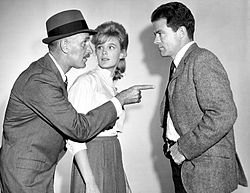This article needs additional citations for verification .(March 2013) |
| The Eleventh Hour | |
|---|---|
 Jack Ging (right) as Paul Graham with guest stars Keenan Wynn and Linda Evans. | |
| Genre | Medical drama |
| Starring | Wendell Corey Jack Ging Ralph Bellamy |
| Theme music composer | Cecil King Palmer Harry Sukman |
| Opening theme | "The Film Opens" |
| Composers | Harry Sukman Morton Stevens John Williams |
| Country of origin | United States |
| Original language | English |
| No. of seasons | 2 |
| No. of episodes | 62 |
| Production | |
| Executive producer | Norman Felton |
| Producer | Sam Rolfe |
| Camera setup | Multi-camera |
| Running time | 45–48 min |
| Production companies | Arena Productions MGM Television |
| Original release | |
| Network | NBC |
| Release | October 3, 1962 – April 22, 1964 |
The Eleventh Hour is an American medical drama about psychiatry starring Wendell Corey, Jack Ging and Ralph Bellamy, which aired on NBC from October 3, 1962, to September 9, 1964. [1]